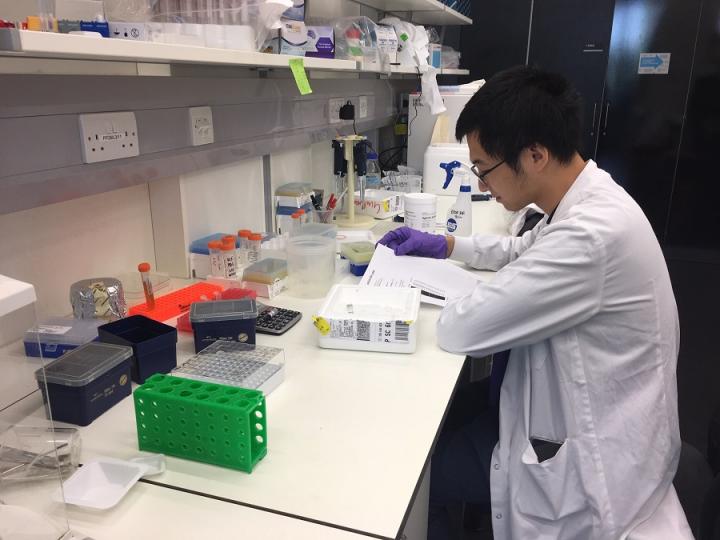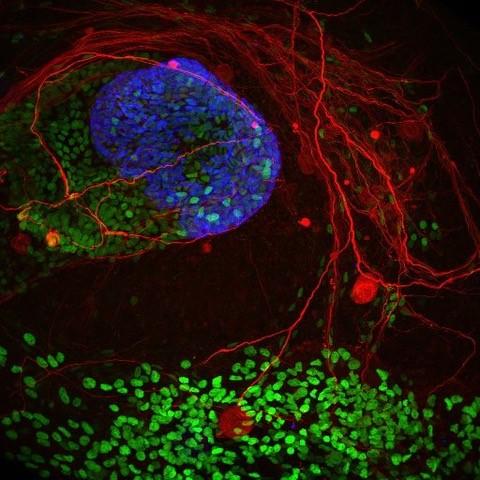Research projects and proposal
Details about choosing and working on your research projects.
The main components of the MSc by Research in Regenerative Medicine and Tissue Repair programme are two 20-week research projects and a 5-week research project proposal writing component.
Research projects
Project selection

You will undertake two research projects in laboratories at the Institute for Regeneration and Repair (IRR), including the Centre of Regenerative Medicine and the Centre for Inflammation research, or collaborative centres. At the start of your studies you will receive a list of available research projects, which have been submitted by programme-affiliated group leaders and which are based around their current research. You will select your top choices from this list of research projects for your first research project, after which projects are allocated to students by the programme team. Ahead of your second research project you will again select your top choices from a list of available projects, before projects are allocated. For your second project you are also encouraged to contact group leaders to discuss your own ideas for a research project. Prior to submitting your choices for your first and second research projects you will have a chance to meet with project supervisors to find out more about their projects.
Project components and format
The research projects are designed to provide you with practical experience of a wide range of current research techniques in cellular and molecular biology and genetics relevant for stem cell biology, developmental biology, inflammation research, regenerative medicine and tissue repair. The research projects will teach you good research practice, and will allow you to gain analytical skills, critical appraisal, presenting and scientific writing skills.

You will be supervised and hosted by a group leader who acts as your primary supervisor. Like a lot of the research carried out at IRR, projects are often performed in collaboration with researchers in other groups, crossing disciplinary boundaries. This gives you first-hand experience in interdisciplinary research, and opportunities to explore potential research topics and career directions. During your research projects you will be exposed to a variety of roles associated with biomedical research, including PhD students, researchers, research coordinators, public engagement officers and research facility managers, which will benefit you when reflecting on your own career path.
During your research projects you will have the chance to practice your academic communication skills through various presentation opportunities, including at lab meetings, a poster day (during Research Project One) and an official research project presentation (at the end of Research Project Two). You will be taught, and hone, your academic writing skills by producing a dissertation about each of your research projects (max 10,000 words per dissertation).
Learning outcomes
- Broad and in-depth understanding of the academic discipline of regenerative medicine and tissue repair
- Fundamental knowledge of designing and conducting a biomedical research project
- Acquire a broad range of relevant laboratory and analytical research skills and associated generic/transferable skills underpinning biomedical research
- Ability to apply good research practice when performing and analysing experiments
- Ability to critically analyse your data, draw relevant conclusions, and formulate meaningful approaches to advance the project
Research Project Proposal
Project design and proposal writing
In consultation with your supervisor you will design and plan Research Project Two. You will write this up as a Research Project Proposal (max 3500 words), comprising background/introduction, hypothesis and aims, and a detailed project plan.
The Research Project Proposal will be written as a grant application and submitted in April for assessment towards your MSc by Research in Regenerative Medicine and Tissue Repair degree. The Research Project Proposal bears 20 credits towards the programme total of 180 credits.
The Research Project Proposal writing course is designed to provide you with practical experience of research project design and planning. This course allows you to develop your academic writing skills. By applying the format of a grant proposal, you will learn to write within the constraints that this format poses on a researcher. Importantly, the project proposal writing course permits you to take ownership of your research project from the start.
Learning outcomes
- Ability to formulate a valid research hypothesis and research aim(s) building on your knowledge and independent learning
- Ability to interrogate your hypothesis by successfully planning a variety of appropriate biomedical experimental approaches
- Gain proficiency in academic writing skills
The research I'm doing is fantastic and it's exactly what I wanted to be doing.
The course focuses on the practical work done in individual projects. This is important because practical experience is vital for a student aspiring to be a researcher

